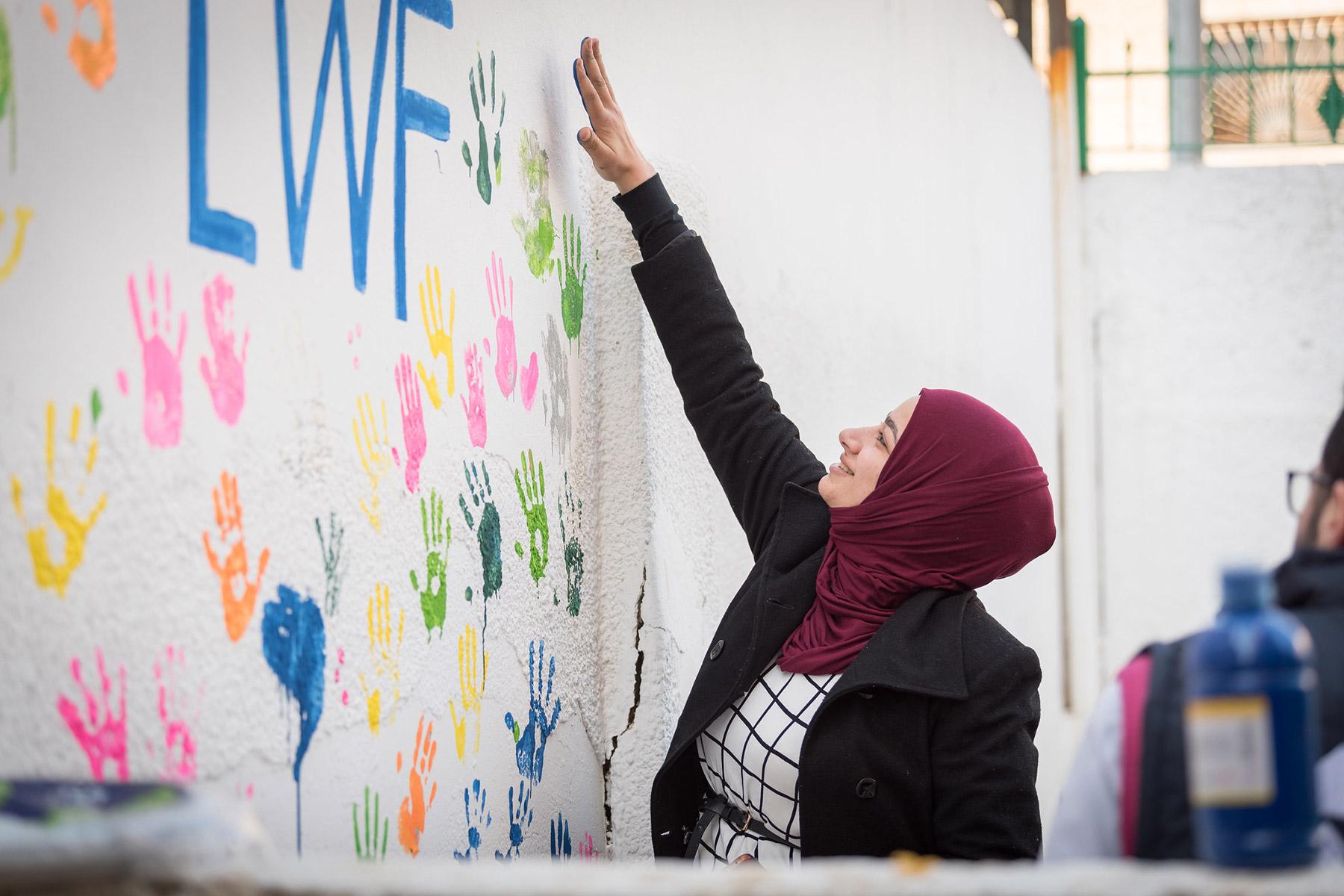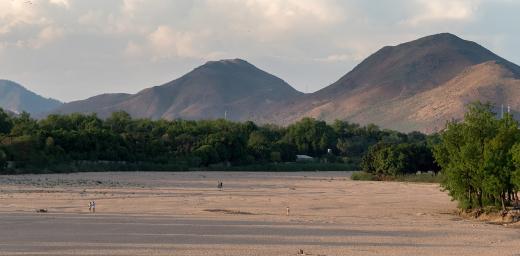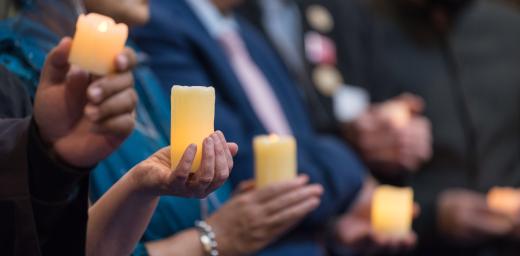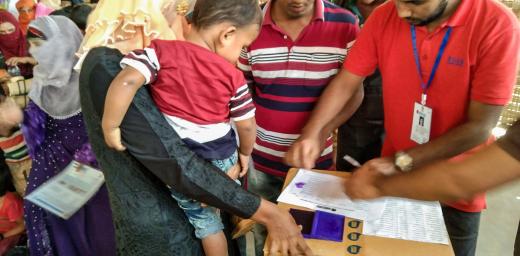Recognizing faith-based perspectives in protecting displaced persons

Zarqa, Jordan: Incentive-Based Volunteer Esraa from Jordan paints her handmark on the wall of the Lutheran World Federation community centre in Zarqa. Through a variety of activities, the Lutheran World Federation community centre in Zarqa serves to offer psychosocial support and strengthen social cohesion between Syrian, Iraqi and other refugees in Jordan and their host communities. Photo: LWF/Albin Hillert
Understanding the unique role and contribution of faith actors
(LWI) - The Lutheran World Federation (LWF) has joined hands with other faith-based humanitarian, development and advocacy organizations to push for a stronger recognition of the unique role that faith-based organizations (FBOs) play in welcoming and protecting displaced persons. Religious and faith group share principles that value human life and well-being. These shared tenets create an opportunity for interfaith collaboration between FBOs, that are present at all levels of society.
“For the LWF, the protection of displaced persons is on the one hand deeply rooted in our faith and Lutheran identity and on the other based on human rights. This shapes our approach. When millions of people are displaced because of the impacts of climate change, violent conflicts and war and other major challenges, welcoming and protecting the stranger is more important than ever” commented Isaiah Toroitich, LWF Head of Global Advocacy.
For the LWF, the protection of displaced persons is on the one hand deeply rooted in our faith and Lutheran identity and on the other based on human rights. This shapes our approach. When millions of people are displaced because of the impacts of climate change, violent conflicts and war and other major challenges, welcoming and protecting the stranger is more important than ever
In a speech during an event organized by LWF, UN partners and faith-based organizations during the 2021 Global Protection Forum, Ms. Cecilia Jimenez-Damary, UN Special Rapporteur on Internally Displaced Persons (IDPs) said that the concept of welcoming the stranger “resonates with the belief that all humanity is one regardless of religion, ethnic origin, color, race, or other discriminatory grounds” adding that “it is in this basic international norm of non-discrimination that we find a commonality in the role of faith-based organizations in humanitarian settings.”
The LWF and its partners have noted that providing diverse forms of psychosocial support including practical emotional and spiritual support to people affected by crises and displacement helps to nurture their mental health, well-being and integration to new settings. It can also create a sense of belonging and solidarity with host communities.
“Because IDPs, refugees and asylum seekers need material assistance as well as spiritual and psychosocial support, the LWF and its partners advocate for and implement methodologies that include both. We also affirm that the faith resources displaced persons have individually and within their communities enable them to overcome the challenges compounded by their displacement” reflected Rev Dr Sivin Kit, Program Executive for Public Theology and Interreligious Relations.
“While there is the need to continue implementing life-saving interventions through humanitarian relief, a comprehensive and holistic approach is required in order to restore the dignity of affected populations” noted Father Archimandrite Emanuel Youkhana, Executive Director and founder of the Christian Aid Program Nohadra (CAPNI), one of LWF partners in Iraq. “IDPs don’t only lose their assets, livelihoods, and social activities, conflicts and crises directly affect their humanity, individually and collectively.”
Trusted community interventions that meet spiritual and material needs
Some sections of the humanitarian sector might be concerned that working with faith-based actors may affect their status as a neutral and impartial international actor. In response to this, however, Aliow Mohamed, Somalia Country Director for the Islamic Relief Worldwide, emphasized that especially in Somalia most of the international non-profit organizations “work with a local staff in rural villages. This allows for context specific approaches that are respected and trusted by the local communities.” Faith-based actors often provide this trust as well since they are already present locally.
Raphael Marcus, Senior Vice President of Programs for the Hebrew Immigrant Aid Society (HIAS) noted that FBOs have demonstrated their unique approach in aiding IDPs in overcoming demanding situations, building resilience, and upholding dignity. “Faith can be an instrument to reach people. It can ensure accountability and the right approach for needs assessment. FBOs through the pandemic have stayed, delivered and related to those hit by COVID19.” He added that FBOs hold a great strength in advocacy and are as diverse as non-FBO agencies.
The Lutheran World Federation (LWF), the Islamic Relief Worldwide (IRW), and HIAS have committed to organize a conference of grassroots faith leaders working to welcome refugees worldwide. “Welcoming the Stranger, Shaping the Future” will be co-hosted by the three organizations in Geneva on World Refugee Day, 20-21 June 2022.
Through fostering greater dialogue and building connections between grassroots and global actors, the conference aims to improve understanding of the work that is being done by local faith actors around the world in implementing the Global Compact on Refugees, including through core protection and peace building work. It will also explore how to enable more supportive environments for local actors to carry out such work, and share learning and best practices that can be replicated at a greater scale.





